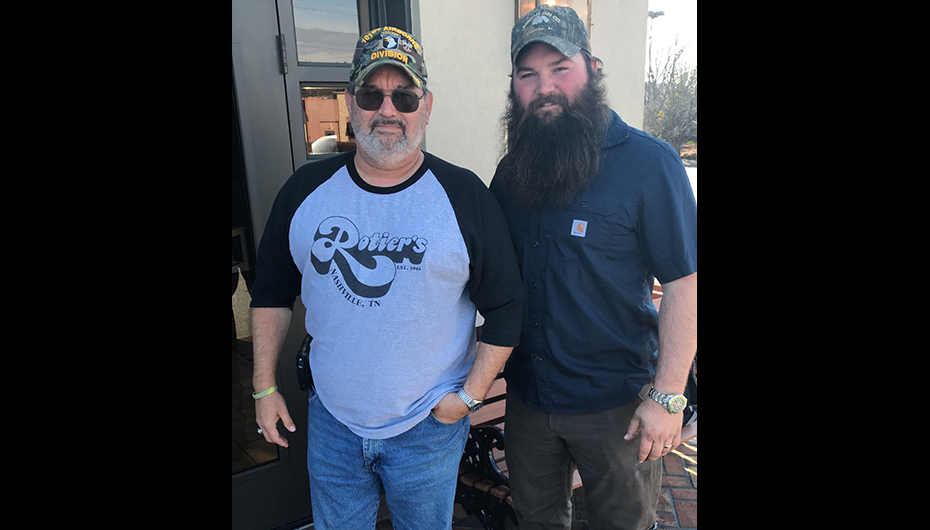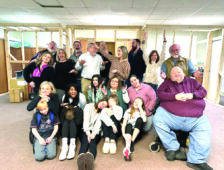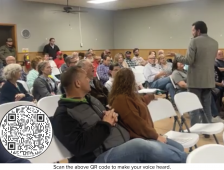PHOTO: Robert Lynch (left) of Tifton, Georgia with Jordan Tatum (right) of Henagar. Tatum chose to donate bone marrow to Lynch several years ago; saving his life. Recently, the two got to meet. (Contributed Photo)
By Marla Jones, Reporter
HENAGAR, Ala. — Everyday, we turn on the television or pick up a newspaper, and all we see is bad news. The World needs a little good news; news that makes you wonder in awe, how small the world is and what a big God we serve.
Jordan Tatum, a 2008 Sylvania graduate, went to a blood drive in Ider, Alabama, for a close friend who was suffering from cancer. He was not aware that donating and swabbing his cheek, to #bethematch for stem cells and bone marrow, would be the good news for Robert Lynch, of Tifton, Georgia, who had recently been diagnosed with Chronic Lymphocytic Leukemia (CCL).

According to the American Cancer Society, Chronic lymphocytic leukemia (CLL) is a type of cancer that starts from cells that become certain white blood cells (called lymphocytes) in the bone marrow. The cancer (leukemia) cells start in the bone marrow but then go into the blood.
In CLL, the leukemia cells often build up slowly over time, and many people don't have any symptoms for at least a few years. In time, the cells can spread to other parts of the body, including the lymph nodes, liver, and spleen.
After making a blood donation, Tatum went on about his everyday life. In Spring of 2016, he received a call from the “Be the Match” Center in Johnson City, Tennessee. Be the Match, helps find the match to the save lives of patients in need. For patients diagnosed with leukemia, lymphoma and other life-threatening diseases, a bone marrow or cord blood transplant may be their best or only hope for a cure. Yet 70 percent of patients who need a transplant do not have a fully matched donor in their family. Tatum was told that he was one of three people who was a close enough match to help.
Tatum was faced with a tough decision. As a farmer who is the part-owner of chicken houses, this was the worst time possible to help. He talked it over with his wife, Jana, a nurse at Erlanger Hospital. Jana, had recently found out she was pregnant with the Tatum's first child. The Be the Match foundation could only tell Jordan a few things about the recipient. He was a 59 year old male, the same age as Jordan’s dad. Jordan knew the excitement his dad had over his grandchildren. He wondered if the recipient had children or grandchildren. The deciding factor for Jordan was a statement made by his wife, Jana: “I watch people die everyday because of people like you that can help but choose not too.” Jordan told Jana to pull the knife out of his heart and call and tell Be The Match, he agreed to the donation.
The first step of the stem cell donation was a strict physical at Vanderbilt Hospital in Nashville, Tennessee. Tatum was deemed healthy enough. He was advised that out of the three eligible donors, he was the one young enough and the only one who decided to help.
Jordan was told that he would have to receive seven shots per day of Neupogen, fourteen days before harvest date. Neupogen is a injection that will help you body make more blood cells increasing bone marrow. The closest facility to obtain the shots would be back at Vanderbilt. Tatum knew that during his planting season, it would be impossible to drive to Nashville, seven days in a roll. Tatum made the request that his brother Patrick, a nurse practitioner, at Northside Medical in Fort Payne, and Dr. Robert Theakston, give him the shot. After paperwork was filed and approved, the vials of Neupogen was delivered to Northside Medical. Theakston donated syringes and everything else for Tatum to receive the necessary shots.
The shots increased bone marrow production and causes intense pain as the bone marrow pushed thru the blood stream. Tatum experienced terrible migraines, hurting in his sternum, femur and in his hip joints. “The flu would be a walk in the park to the pain I felt,” said Tatum.
On the donation date, Tatum and his family were unsure of how the bone marrow would be harvested. It could be thru a shot in the hip to extract or thru the elbow. Tatum received a needle as Tatum describes it as “the size of a #2 pencil” in his elbow. The procedure took over six hours and was extremely painful. He only could lay in the bed and endure the pain. The blood left his body at ninety-eight degrees and came back in filtered, at seventy degrees.
After the procedure,Tatum was released to go. After resting a couple hours, he went and “ate the biggest steak he could find”. For weeks leading up to the donation, he could not eat any sushi, raw shrimp, or even a rare steak. His blood had to be completely clean. The recipient had to have a strong dose of chemotherapy to deplete all of his white blood cells to make it less likely to reject.
It took Jordan several months to get back to one hundred percent after the donation. Tatum went back to his life, receiving calls to check on him, weekly from Be the Match. He also received calls telling him how the recipient was doing as well. The recipient had to stay in the hospital for five months after receiving the donation. He did not know where the recipient lived but knew if he was from the United States, that he could fill out the necessary paperwork to reach out to him, after a year. If he was from outside the United States, it would be two years before he could reach out to the recipient.
One year from the donation date, Tatum received a call that he could fill out paperwork to talk to the recipient. “I was so excited to know I helped out a fellow American,” said Tatum. “I submitted my paperwork not knowing if he would agree to getting in contact with me. Working thru a third party, we made contact with each other and agreed to meet as he was returning from a checkup at Vanderbilt.
On February 6, 2018 Jordan Tatum met Robert Lynch in Douglasville, Georgia. The two talked several hours. They neither one, knew what the other one had went thru for the donation. Lynch’s blood type was A+ but after the donation, he took on Tatumns blood type of 0+. Tatum was pleased to find out that Lynch was very much like his dad and had four grandchildren.. The help by Tatum will insure that he will be around for many years to enjoy them. “Robert Lynch and his wife are the most down to earth people you could ever meet” said Jordan Tatum. “I could not be more proud to help. It’s easy to help someone financially, but this was something money could not buy. This was life-saving help.”
Lynch is in remission and enjoying life with his wife, children and grandchildren. “I appreciate everything Jordan did to help. He will be in my thoughts and prayers for the rest of my life” said the recipient, Robert Lynch. “I give me a shot at life. I got lucky that he decided to go thru it. He was the youngest and closest match.”
“Normally, I wouldn't want to be in the spotlight” said Jordan Tatum. “I was oblivious of the impact that this would be. The support was awesome. I hope this inspires people to donate and do the right thing . If you are a match, you are one of the few who in the world who could actually say you helped save someone's life.”
To learn more on how you can be the good news in someone's life, go to http://www.bethematch.org.




